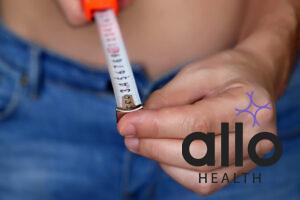How Much Does a Penis Weigh? An Overview of Average Penis Weight

Allo Health is dedicated to personalized well-being, offering support and trusted information tailored to individual health goals. The platform emphasizes human-generated content, led by a distinguished medical team of experts, including physicians and sexual health specialists. Their commitment to credibility involves rigorous fact-checking, authoritative research, and continuous updates to ensure accurate, up-to-date information. Allo Health's unique approach goes beyond conventional platforms, providing expert-led insights and a continuous commitment to excellence, with user feedback playing a crucial role in shaping the platform's authoritative voice.

Ms Ashima Sahore has a masters in Clinical Psychology and has been working avidly in the space of therapy and research for the past 2 years. Her expertise lies in areas of stress, depression, anxiety, improving self-esteem, confidence, body appreciation among many others. She imbibes a wholesome approach to therapy and provides a non-judgemental, LGBTQAI+, and safe space.
Why This Was Upated?
Our experts continually monitor the health and wellness space, and we update our articles when new information became available.
Updated on 25 September, 2023
- Article was updated as part of our commitment to diversity, equity, and inclusion.

"The following blog article provides general information and insights on various topics. However, it is important to note that the information presented is not intended as professional advice in any specific field or area. The content of this blog is for general educational and informational purposes only.
Book consultation
The content should not be interpreted as endorsement, recommendation, or guarantee of any product, service, or information mentioned. Readers are solely responsible for the decisions and actions they take based on the information provided in this blog. It is essential to exercise individual judgment, critical thinking, and personal responsibility when applying or implementing any information or suggestions discussed in the blog."
Penis weight is one aspect of men’s health that is often overlooked or ignored. It is an essential part of understanding male anatomy and can have a significant impact on overall health and well-being. The weight of the penis is a topic that sparks curiosity and raises numerous questions. From internet rumours about penile enlargement methods to claims of miraculous results from penis pumps, the world of penis weight has seen its fair share of myths and misconceptions. Let’s dive into the truth behind the numbers and explore the factors that influence penis weight. In this article, we will explore the topic of penis weight and delve into the various factors that affect it. Here is everything you need to know about average penis weight, why it matters, and how to maintain it.
How Much Does a Penis Weigh?

Average Penis Size and Weight: When it comes to length, the average penis length is 3.61 for a flaccid penis and 5.16 inches for an erect penis. On average, adult penises weigh approximately 20 to 30 grams, but there is a wide range of normal weights. Factors like body mass index (BMI), age, and lifestyle can influence the weight of the penis. However, it is essential to remember that penis size does not dictate sexual satisfaction or prowess.
How to Measure Penis Weight?
Measuring penis weight can be done with a simple weighing scale. However, due to the sensitive nature of the topic, it is often not a routine measurement in general medical practice. However, there are ways to estimate penis weight using formulas based on erect and flaccid penis measurements.
The Complexity of Penile Anatomy: Before we delve into the weight aspect, let’s acknowledge the complexity of the human penis. Each penis is unique, with variations in size, shape, and weight. Penises come in all sizes, and there is a considerable range that falls within the realm of normal.
Understanding the Measurement: The concept of measuring the weight of a penis may seem unusual, but some individual research studies do explore penile measurements. To be clear, measuring penis weight in grams is not a common practice in medical or scientific settings. Instead, penile measurements often focus on length and girth to understand various health aspects.
The Cylinder Formula: Estimating Penis Weight with Length and Circumference: One of the most commonly used formulas for estimating penis weight is the “cylinder formula,” which calculates the volume of the penis based on its length and circumference. This formula assumes that the penis is cylindrical in shape, which may not be accurate for all individuals.
The Ellipsoid Formula: Accounting for Variations in Penis Shape: Another formula, known as the “ellipsoid formula,” takes into account the fact that the penis is not perfectly cylindrical and calculates its volume based on its length, width, and height.
Diagnosis of Peyronie’s Disease: While measuring penis weight may not be a routine medical practice, it can be useful in certain situations. For example, it may be helpful in the diagnosis and treatment of conditions such as Peyronie’s disease (a condition where fibrous scar tissue in the penis causes curved painful erections), which can cause curvature of the penis. Additionally, measuring penis weight may be of interest to researchers studying sexual health and anatomy.
Why Penis Weight Matters: Insights from Medical Experts
Understanding Standard Penile Measurements: In medical settings, penile measurements are taken primarily for diagnosing conditions like Peyronie’s disease, erectile dysfunction, or other penile disorders. These measurements help doctors assess health and recommend appropriate treatments, but they do not focus on penis weight.
Significance of Penis Weight in Men’s Health: Penis weight is an important factor in men’s health because it can be an indicator of overall physical fitness. According to medical experts, maintaining a healthy weight is essential to prevent a range of health issues, including heart disease, diabetes, and high blood pressure. It is, therefore, crucial to pay attention to the weight of your penis as well.
Weight and Its Impact on Sexual Performance: Penis weight can also affect sexual performance. A study published in the Journal of Sexual Medicine found that men with a higher body mass index (BMI) and a heavier penis had a higher risk of erectile dysfunction. Excess weight can lead to reduced blood flow to the penis, making it harder to achieve and maintain an erection.
Maintaining a Healthy Weight for Better Sexual Health: Maintaining a healthy weight and paying attention to the weight of your penis can not only improve your overall health but also enhance your sexual performance.
What Are the Factors That Affect Penis Weight?
There are several factors that can affect penis weight, including genetics, age, and lifestyle habits.
Role of Genetics and Age in Penis Weight: Genes play a significant role in determining penis size and weight. Age also influences penis weight since the muscle tone and elasticity of penile tissue decrease with age.
Lifestyle Habits and Their Effect on Penis Weight: Lifestyle factors such as diet, exercise, and smoking can also impact penis weight. A healthy lifestyle can result in higher penis weight and overall better physical health.
Medical Conditions and Penis Weight: Another factor that can affect penis weight is the presence of certain medical conditions. Conditions such as Peyronie’s disease, which causes the penis to curve, can also result in a decrease in penis weight. Additionally, obesity can lead to a decrease in penis weight due to the accumulation of fat in the pubic area. It is important to maintain a healthy weight and seek medical attention if any concerning symptoms arise.
Obesity and Smoking: Obesity and smoking have been linked to lower penis weight, while regular exercise and a healthy diet can help maintain a healthy weight. Additionally, certain medical conditions such as Peyronie’s disease can cause abnormal penis weight and require medical treatment.
Lifestyle: Another factor that can affect penis weight is lifestyle. Men who are overweight or obese may have smaller penises due to the accumulation of fat in the pubic area. On the other hand, men who exercise regularly and maintain a healthy weight may have larger penises due to increased blood flow and testosterone levels.
What Is the Relationship Between Penis Size and Weight?
The Role of Human Penis Growth: During puberty, the penis undergoes a growth spurt, reaching its full size by early adulthood. After this phase, the penis generally remains stable in size and weight throughout a man’s life.
One study conducted in 2015 found that men with a higher body mass index (BMI) tended to have smaller penises than those with a lower BMI. However, the study did not establish a direct correlation between weight and penis size. Other factors, such as genetics and hormonal levels, may also play a role in determining penis size. It is important to note that penis size does not necessarily correlate with sexual pleasure or satisfaction for either partner.
Normal vs. Abnormal Penis Weight: When to Seek Medical Attention
Penis weight varies significantly between individuals, and there is no standard measurement for what is considered normal. In general, a healthy penis weight is one that allows for normal sexual function. If you experience issues such as erectile dysfunction or discomfort during sexual activity, it may be a sign of low penis weight, and it is essential to seek medical attention.
How to Increase Penis Weight Naturally: Diet, Exercise, and Supplements
Some ways to improve penis weight are:
- Maintain a Healthy Lifestyle: A balanced diet, regular exercise, and adequate hydration help support healthy blood flow to overall well-being, including penile health.
- Kegel Exercises: Kegel exercises target the pelvic floor muscles. These exercises involve contracting and relaxing the pelvic floor muscles, similar to stopping the flow of urine midstream. Strengthening the pelvic floor muscles can lead to increased blood flow to the pelvic region, potentially enhancing erectile function and supporting firmer and longer-lasting erections.
- The Role of Physical Activity: Physical activity and overall health can play a role in sexual function and satisfaction, but they do not directly impact penis weight. Maintaining a healthy lifestyle, including regular exercise and a balanced diet, is crucial for overall well-being, including sexual health.
- Practice Safe Sex: Engaging in safe sexual practices, such as using condoms, can help prevent sexually transmitted infections (STIs) that may affect penile health.
- Limit Alcohol and Tobacco: Quitting smoking and alcohol consumption can improve blood circulation which is essential for sexual function.
- Manage Stress: Engage in stress-reducing activities like yoga, meditation, or hobbies to manage stress.
- Stay Hydrated: Drinking water is crucial for maintaining overall health, including the health of your reproductive system.
- Maintain Good Hygiene: Wash your penis regularly with warm water to help prevent infections and promote healthy skin.
Common Myths About Penis Weight Debunked by Experts

Myths and Facts about Penis Weight:
Myth: Penis weight is directly proportional to its size.
Fact: Penis weight is not directly related to its size. Penis size is primarily determined by its structure and blood flow, while weight is influenced by various factors.
Myth: A heavier penis is always healthier.
Fact: Penis weight is not a definitive indicator of penile health. Other factors, such as blood flow, muscle mass, and overall sexual function, play a more significant role in determining penile health.
Myth: Penis weight remains constant throughout life.
Fact: As men age, their penises may experience some weight loss due to decreased muscle mass and blood flow. However, exercises and treatments can help maintain penis weight and improve sexual health.
Myth: Penis weight is solely determined by genetics.
Fact: While genetics can play a role in penis size and weight, lifestyle factors such as diet, exercise, smoking, and alcohol consumption can also impact penis weight and sexual function.
Myth: There is a universal ideal penis weight.
Fact: No standard or ideal penis weight applies to all individuals. Penis weight can vary significantly between men based on various factors, and no one-size-fits-all measurement.
The Impact of Hygiene and Holistic Approaches on Penis Weight
- Regular Cleaning and Grooming: Proper hygiene practices, including regular cleaning and grooming, can prevent the build-up of bacteria and debris, reducing the risk of irritation and infection. This is crucial for maintaining healthy sexual function.
- Optimal Penis Weight: Proper hygiene also contributes to optimal penis weight. Regular cleaning prevents dead skin cells, sweat, and debris accumulation, promoting better blood flow to the area and resulting in a healthier and more responsive penis.
Psychological Impact of Penis Weight on Men’s Self-Esteem
- Impact on Self-Esteem: Penis weight can impact men’s self-esteem and confidence. Just as no two individuals are alike, penises come in various shapes, sizes, and weights. Comparing penis weight in grams of penis weight or cubic inches can lead to unnecessary anxiety and obsession with size. Those with lower penis weight may experience feelings of inadequacy and low self-worth. Compassion and sensitivity are essential when discussing issues related to penis weight. Human penises come in a vast array of sizes, and there is no “one size fits all” when it comes to penis weight. Differences in penis size are entirely normal, and it is essential to respect and embrace these variations.
- Addressing Other Factors: It’s important to note that penis weight is not the sole factor affecting self-esteem. Body image, sexual performance, and societal expectations also play a role. Taking a holistic approach and addressing these issues openly can promote positive self-image.
- Seeking Support: For individuals struggling with issues related to penis weight or self-esteem, seeking support from healthcare professionals or mental health professionals can be beneficial in addressing concerns and finding appropriate solutions. Encouraging open communication helps reduce stigma and fosters a healthier outlook on body image and sexual health.
How Do Penile Implants Increase Penis Weight?
Penile Implants: Enhancing Sexual Function and Satisfaction:
Penile implants offer a groundbreaking solution for individuals with abnormally low penis weight, significantly improving sexual function and satisfaction.
- Types of Penile Implants: There are two main types of penile implants – inflatable and non-inflatable models. Each type has distinct features; the choice depends on the individual’s needs and preferences.
- Inflatable Implants: This type of implant includes two inflatable cylinders that are surgically placed in the penis, along with a fluid-filled reservoir located in the abdomen. A pump is implanted in the scrotum, allowing the user to manually inflate the cylinders with fluid to create an erection. To return the penis to a flaccid state, the fluid is pumped back into the reservoir. Inflatable implants offer a more natural-feeling erection and the ability to control the timing of erections.
- Semi-Rigid (Malleable) Implants: These implants consist of bendable rods that are inserted into the penis. The user can easily bend the penis upward for sexual activity and bend it downward when not in use. Semi-rigid implants are relatively simple and do not require any pumping or inflation. They are a good option for men who have difficulty operating a pump or prefer a constant semi-rigid state.
- Non-Inflatable Implants: This type of implant involves placing solid, non-bendable rods inside the penis. The penis remains in a semi-rigid state at all times, which may not be as flexible as the other types of implants. Non-inflatable implants are suitable for men who do not want the additional complexity of inflatable or semi-rigid devices.
- Consulting with a Healthcare Professional: It is crucial to seek advice from a healthcare professional to understand the options, potential risks, and benefits of penile implants.
Potential Risks and Complications: While penile implants can be effective, they come with potential risks such as infection, mechanical failure, and implant erosion. A thorough discussion with a healthcare professional helps assess the balance between benefits and risks.
Unveiling the Myths of Penis Enlargement Methods: The internet is filled with claims of penile enlargement methods that promise miraculous results. From supplements to gadgets and pumps, there is no shortage of products claiming to increase penis size or weight. Unfortunately, many of these claims lack clinical evidence and can be misleading or even harmful.
How to Choose the Right Underwear for Maximum Comfort and Support?
- Proper Size and Support: Select underwear that fits well and provides proper support. The right size ensures comfort and prevents any constriction that may impact blood flow to the penis.
- Breathable Materials: Opt for underwear made from breathable materials like cotton or bamboo. These fabrics help maintain ventilation, reducing the risk of bacterial buildup and irritation.
- Consider Style: Different styles offer varying levels of support and comfort. Briefs provide more support, while boxers offer breathability and freedom of movement. Choose a style that suits your preferences and lifestyle.
- Regular Replacement: Replace old or worn-out underwear regularly. Elasticity and support can diminish over time, leading to discomfort or even injury. Changing underwear every six months to a year is recommended based on usage and washing frequency.
Key Takeaway
- Understanding penis weight is crucial for overall men’s health, impacting physical and mental well-being.
- Age-related changes in testosterone levels can lead to a decrease in penis weight due to muscle mass and tissue weakening.
- Maintaining a healthy lifestyle through regular exercise, kegel exercises, and a balanced diet can help preserve muscle mass and prevent excess body fat, contributing to optimal penis weight.
- Penis weight plays a role in sexual function, affecting the strength of erections and overall sexual satisfaction.
- The idea of comparing penis weight in grams of penis weight or cubic inches can lead to unnecessary anxiety and obsession with size. It is crucial to remember that larger penis size does not determine one’s worth or sexual prowess.
- Men should pay attention to their penis weight and take steps to maintain it for healthy sexual function and satisfaction.
- Consulting with healthcare professionals when necessary can provide valuable insights and guidance in optimizing penis weight and sexual health.
Frequently Asked Questions:
Q. What Is the Average Size of an Adult Penis?
Average-Sized Penis: The average penis length is 3.61 for a flaccid penis and 5.16 inches for an erect penis. There is no universal standard for an “average-sized” penis, as the range of normal is quite extensive. Obsession with penis size can negatively impact sexual performance.
Q. Who Has Decreased Penis Width?
Decreased penis width, also known as penile atrophy, can occur in various individuals due to different factors. It is more commonly observed in older men as a natural part of the aging process, where decreased testosterone levels and reduced blood flow may contribute to a shrinkage in the penile tissue. Additionally, individuals with certain medical conditions, such as Peyronie’s disease or erectile dysfunction, may experience a decrease in penis width due to scar tissue formation or reduced blood circulation. Psychological factors like stress, anxiety, or depression can also contribute to temporary changes in penis size.







































